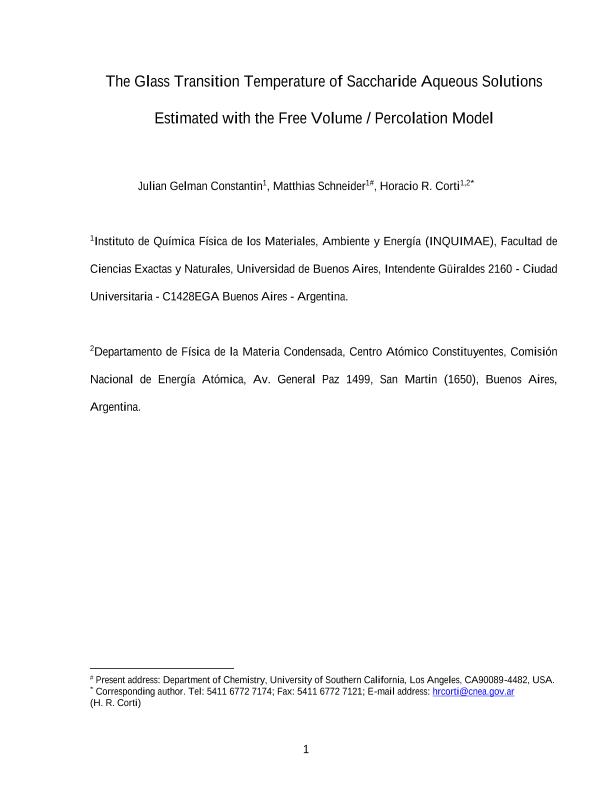Artículo
Glass Transition Temperature of Saccharide Aqueous Solutions Estimated with the Free Volume/Percolation Model
Fecha de publicación:
05/2016
Editorial:
American Chemical Society
Revista:
Journal of Physical Chemistry B
ISSN:
1520-6106
Idioma:
Inglés
Tipo de recurso:
Artículo publicado
Clasificación temática:
Resumen
The glass transition temperature of trehalose, sucrose, glucose, and fructose aqueous solutions has been predicted as a function of the water content by using the free volume/percolation model (FVPM). This model only requires the molar volume of water in the liquid and supercooled regimes, the molar volumes of the hypothetical pure liquid sugars at temperatures below their pure glass transition temperatures, and the molar volumes of the mixtures at the glass transition temperature. The model is simplified by assuming that the excess thermal expansion coefficient is negligible for saccharide–water mixtures, and this ideal FVPM becomes identical to the Gordon–Taylor model. It was found that the behavior of the water molar volume in trehalose–water mixtures at low temperatures can be obtained by assuming that the FVPM holds for this mixture. The temperature dependence of the water molar volume in the supercooled region of interest seems to be compatible with the recent hypothesis on the existence of two structure of liquid water, being the high density liquid water the state of water in the sugar solutions. The idealized FVPM describes the measured glass transition temperature of sucrose, glucose, and fructose aqueous solutions, with much better accuracy than both the Gordon–Taylor model based on an empirical kGT constant dependent on the saccharide glass transition temperature and the Couchman–Karasz model using experimental heat capacity changes of the components at the glass transition temperature. Thus, FVPM seems to be an excellent tool to predict the glass transition temperature of other aqueous saccharides and polyols solutions by resorting to volumetric information easily available.
Palabras clave:
Glass Transition
,
Saccharide
,
Water
,
Free Volume
Archivos asociados
Licencia
Identificadores
Colecciones
Articulos(SEDE CENTRAL)
Articulos de SEDE CENTRAL
Articulos de SEDE CENTRAL
Citación
Gelman Constantin, Julián; Schneider, Matthias; Corti, Horacio Roberto; Glass Transition Temperature of Saccharide Aqueous Solutions Estimated with the Free Volume/Percolation Model; American Chemical Society; Journal of Physical Chemistry B; 120; 22; 5-2016; 5047-5055
Compartir
Altmétricas




